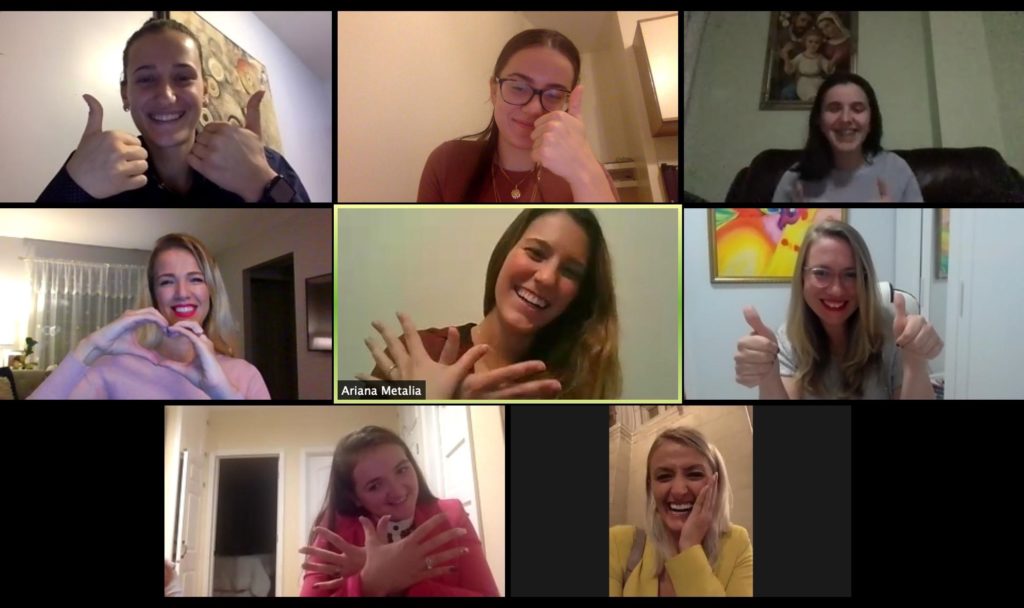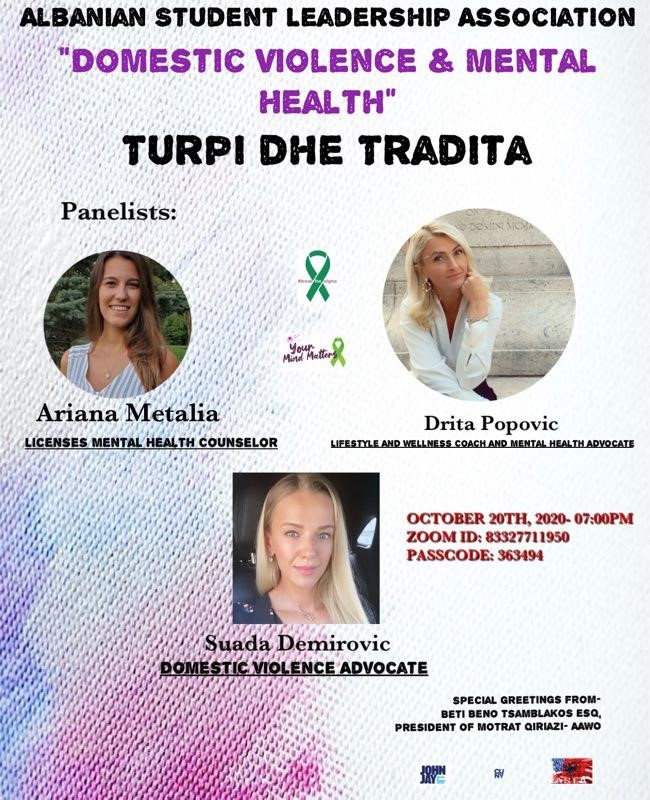
Building a Cohesive Community through Healthy Relationships-

By @Albanian-American Cohesion Community-
Our Albanian culture is so rich and unique. We love being Shqiptar/e (Albanian) in the United States of America. Far away from homeland, (kaluar oqeanit) we see the waiving proud Albanian flag, hear people speak Albanian in local stores and see students in Colleges wearing Albanian Eagle shirts while studying and leading! Just like any other culture and immigrant group we have faced many obstacles, challenges and struggles. We are resilient, we are compassionate and more importantly we are united for the common good.
We care that our very own are experiencing domestic violence, mental illness, drug addiction and/or shamed by the very traditions that we uphold. We honor our sisters and brothers who have lost the battle with this silent killer and many others who have suffered in silence and still do.
We hold a deep admiration for the brave and trailblazers of our community including our ancestors, mothers, fathers, sisters, brothers, aunts, uncles, nieces, nephews, friends and activists of our community who embrace our differences and have supported us through difficult times. We respect all of you who have let us grow free and supported us all the way despite the fact that we have been shamed for fighting mental illness, being LGBTQ, marrying outside of our race/ethnicity, fighting our struggles with drug/alcohol addiction, divorced or other. We are very proud of us building a community that reflects today’s Albanian-American generational successes, struggles and values. “Turpi and Tradita” (shame and traditions), impact us all in ways that we as a cohesive community are trying to highlight.
The birth of this movement, @Albanian-American Cohesion, began in September 2020 when many of the Albanian-American activists, advocates, academics, practitioners, organizations, victims and survivors despite COVID-19 and US election turmoil came together to promote belonging with a common vision of appreciating and valuing our culture, while always challenging ourselves to be better because we love, respect and value our community.
On, Tuesday, October 20th, 2020, the Albanian-American Cohesive Community partnered with Albanian Student Leadership Association (ASLA) at John Jay College of Criminal Justice led by social-justice fierce students Antoneta Pepkolaj, Uendi Muhameti, Arjola Ferhati and Gabriela Pllumbaj together with Albanian-American Women’s Organization Motrat Qiriazi in New York to honor Domestic Violence Month and give our victims and survivors a platform to share their stories and evaluate the services available to our community. Panelists included Ariana Metalia, Licensed Mental Health Counselor, Drita Popovic, Lifestyle and Wellness Coach and Mental Health Advocate, Suada Cecunaj, Domestic Violence Advocate. A special greeting was provided by Beti Beno Tsamblakos Esq., President of Albanian-American Women’s Organization Motrat Qiriazi.
The topic of domestic violence in the Albanian-American community is a taboo despite the fact that we anecdotally know that our daughters, sisters, aunts, nieces, neighbors and friends are suffering in silence. Prof. Anila Duro, Adjunct Professor and Doctoral Candidate, strongly believes that it is our collective responsibility to speak up and do something—silence is complicit and harmful to our lives. One-way academics such as Prof. Duro and Ariana Elezaj, Master of Public Policy and Administration graduate student at John Jay College believe that we can tackle social and mental health issues is through rigorous academic research. Prof. Duro together with John Jay Students and members of the Albanian-American Cohesion working group and other community partners have launched the first scientific study to measure the prevalence of domestic violence with a mission to build healthy, respectful and cohesive relationships in our community. This project has sparked the interest of a large group of Albanian-American Women advocates from East to West coast. The Albanian-American Cohesive Community is taking an important role in the design of the study as researchers are embodying participatory action research methods. Our goal is to empower our community, to create a safe space by telling our stories in a confidential and anonymous way where the findings lead to awareness, education, resources, and interventions. We are measuring for all types of unhealthy personal relationships including the invisible types such as emotional, verbal, financial, and social.
The benefits of this community work are many:
- Healing
- Not feeling alone
- Empowerment
- Inclusion
- Helping others
- Help younger women see the signs/prevention
- Identify victim blaming—not your fault
- Know the exact areas where we can intervene by educating our community
Clinicians such as Ariana Metalia, LMHC stressed the importance of caring for our mental wellbeing in tandem with our physical health. She stated our community needs further education about the overlapping relationship between our mental and physical health. In discussing these topics openly with the proper information, we can normalize mental illness as a general health concern the same way we view any other disease or illness. Her hope is that Albanians can feel comfortable reaching out for help when they are experiencing mental health concerns, and furthermore that we can get to a place where therapy and psychiatric treatment can be utilized as preventative tools for support, not just when a crisis arises or when an issue becomes unmanageable for the family. She also highlighted trauma informed care as a movement that every healthcare professional and the general public should become aware of. It is well known that Albanians have a long history of traumatic experiences as a result of their fight for self-determination from occupying forces. She stated that these wars have lasting effects in both the minds and bodies of the people in our homeland and the diaspora. We need to acknowledge that trauma is tied so deeply in our history and understand how this can affect our health across lifetimes. At present, Ariana Metalia, works for Northwell Health and runs a private practice doing weekly individual therapy with teens to help manage anxiety and depression. She has confidence in the Albanian community’s ability to come together and believes that in sharing the correct information and starting these discussions in a constructive manner, we can reach so many of our families to inspire change, by tapping into the strong, helpful, caring unity that we Albanians are known for.
Advocates of our community, Bedrie Tale, Board Member of Our Voice (Zëri Ynë) and an active member of Shoqni-Albanian American Women’s Club emphasized that breaking the stigma of “marre” is key to feeling healthy and the importance of communication and raising awareness so our children can grow up healthy mentally and physically.
Suada Cecunaj, Domestic Violence Advocate and Financial Analyst, explores the need to reevaluate this idea of turp (shame) and the proper word we should be using is guilt (faj). Shame is I AM BAD, guilt is I did something bad. No one is biologically bad. It is our actions and bad choices that cause us to feel guilty. We can recover from bad choices in a healthy manner if we remove shaming. Guilt is beneficial, we can learn from our mistakes and grow as people. There are no benefits to shame other than belittling, excluding, and dehumanizing one’s self. After all we are all human and we are all prone to mistakes.
Drita Popovic, Lifestyle & Wellness Coach and Mental Health Advocate, fearlessly addressed wellness, physical and psychological health and put the emphasis on the importance of women taking care of themselves. Topics like wellness and self-care are not openly discussed within our community. This could be due to the stigma of mental illness or lack of cultural knowledge on the importance of self-care and mental health. Such topics have been silenced for far too long and people should and must start having open discussions. Many refer to self-care as selfish behavior, but others should not be allowed to dictate the life you live. Physical and psychological help are connected and are equally important. When facing an overwhelming emotional experience, many people feel lost, isolated and alone. Therapy and coaching are not a magic pill, it takes commitment and dedication, it is a way to relieve that sense of aloneness and form a trusting relationship with someone who accepts you as you are. Each individual is complex and requires a personalized approach. Regardless of the problems a person might be facing, professionals are active participants who offer empathy, authenticity, expert insight, and focus on your wellbeing. Regardless of the issues you are facing today you can get help and support, feel empowered to grow and thrive towards self-fulfillment.
With every act of self-care your authentic self gets stronger, and the critical, fearful mind gets weaker. Every act of self-care is a powerful declaration: I am enough, enough is enough.
Advocate and Activist like Suada Cecunaj always uplift us by reminding us that we have a beautiful culture, but we must change the mentality discussing issues that impact us on a daily basis. Our primarily goals are to empower survivors of gender based violence so this does not happen to anyone else, educating our community that there is help out there, ensuring that we are in this together and continue to address this idea of “marre—shame” that you should have not let this happen to you.
Prof. Duro who is also the Faculty Advisor of ASLA is a firm believer that “knowledge is power” and that is why students, activists and practitioners need to conduct more research to highlight our experiences, generate theory that is so deeply rooted in our culture and provide evidence-based interventions.
Beti Beno Tsamblakos Esq., President of AAWO Motrat Qiriazi, Ariana Elezaj, Secretary of AAWO Motrat Qiriazi, and its Board of directors are very enthusiastic and supportive about this initiative. In her remarks, Ms. Beno underscored the organization’s commitment to be here to spread awareness and break the silence. We want our community to know and understand what is happening in silence so that does not ever happen again to our sisters, mothers and daughters. The victims of domestic violence not only endure physical and psychological sufferings but continue to suffer the long-term effects and stigma to this very day. We want to bring dignity and acceptance to the survivors of domestic violence as they integrate into society but foremost we call upon and empower younger generations, like the Albanian Students at John Jay College of Criminal Justice, to have their voice in society as they strive for equity in family life and their workplace. Let this be the beginning of a long-term partnership and let us start the healing process together and be their voice.
In the powerful words of Drita Popovic, change comes through teamwork and inclusion. We are strong alone, but powerful together and through open discussions change is possible. Let’s brake stigmas and stop allowing others to dictate what topics we speak about and how we live our lives. “Time to make change not just speak about the importance of change” @Albanian-American Cohesion. For questions or collaboration inquires please feel free to contact
aacohesivecommunity@gmail.com.